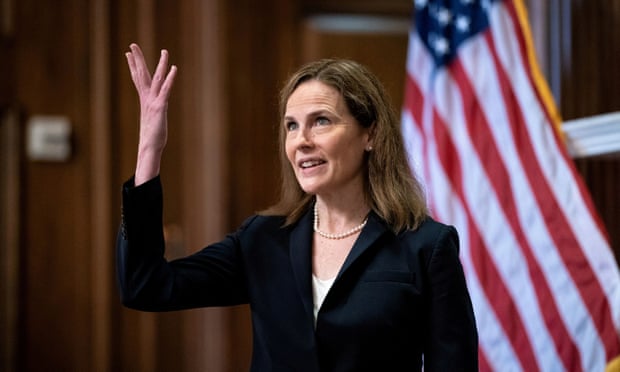Revealed: leaked video shows Amy Coney Barrett’s secretive faith group drove women to tears
Wife of founder of People of Praise says members ‘were always crying’ during discussions about women’s subservience to men

The People of Praise, a secretive Christian faith group that counts the conservative supreme court justice Amy Coney Barrett as a member, considered women’s obedience and subservience to men as one of its key early teachings, according to leaked remarks and writings of the wife of the group’s founder.
A leaked video of a recent private People of Praise event, marking its 50th anniversary, shows Dorothy Ranaghan explaining how some female followers of the faith group cried intensely in reaction to the group’s early teachings on “headship” and the “roles of men and women”, in which men are considered divinely ordained as the “head” of the family and dominant to women.
Asked in an interview during the anniversary event about the years after the group’s members first made a “covenant” to join People of Praise in the early 1970s, Dorothy Ranaghan said: “Some of the women – who are still in my women’s group, as a matter of fact – were wearing sunglasses all the time, because they were always crying and would have to hold on to their chairs every time somebody started teaching, because ‘What are we going to hear this time?’”
She then added, as the audience and her interviewer laughed: “But it all worked out just fine in the end.”
The comment marks the first time a statement about some women’s negative early responses to “headship” teachings has been published. The leaked footage was shared with the Guardian by a source who asked to remain anonymous.
Former members of People of Praise, many of whom are critical of the group’s dominance over members’ lives, have described the group as calling for complete obedience of women to their husbands.
The Guardian has previously reported that one of the group’s former members described in a sworn affidavit filed in the 1990s that Kevin Ranaghan – the group’s founder and Dorothy’s husband – exerted almost total control over her when she was living in the couple’s household, including making all decisions about her finances and dating relationships. It also embraces traditions like encouraging members to speak in tongues, and performing exorcisms.
Barrett, who lived in the Ranaghan household while she attended law school at Notre Dame, has never publicly disclosed or discussed her membership in the Christian charismatic sect, where her father had a leadership role and where she previously served as a “handmaid”. Barrett has said she is a “faithful Catholic” whose religious beliefs would not “bear in the discharge of my duties as a judge”.
But while Barrett’s personal faith-based opposition to abortion rights and Roe v Wade were known before her 2020 confirmation and before she joined a majority of justices in overturning the landmark ruling that protected abortion rights nationally, less is known about the culture in which Barrett was raised and its views on women and childbirth, suffering, and their role in society.
Barrett has never addressed how the reversal of Roe might effect a woman’s life. But during oral argument in Dobbs v Jackson, the supreme court case that ultimately overturned Roe, Barrett referred specifically in questions to the availability of so-called “safe haven” laws across the US, which allow mothers to abandon newborns in designated locations without the risk of punishment.
Barrett suggested that the availability of such legal protections for new mothers meant that while women might be forced to give birth if Roe were overturned, they would not necessarily be forced to become parents, or be burdened by parenthood.
The line of questioning was decried as “cruel and dangerous” by pro-choice activists and writers, who said that seeing safe haven laws as a viable replacement for reproductive choice ignored real health risks associated with pregnancy and childbirth, and ignored women’s rights to bodily autonomy.
Barrett’s question also appears to echo the People of Praise culture in which she was raised and has chosen to remain a part of, which emphasizes the importance of childbirth, pregnancy, and the abandonment of autonomy and privacy it supposedly entails, as a core part of what it means to be a woman.
In her early writings, Dorothy Ranaghan emphasized the need for women to be “self-giving, responsible and reserved”. In a 1978 article that appeared in New Covenant magazine, called “Fully a Woman”, childbearing is described as a “central reality of womanhood” that “determines our presence in the world”, even for those who “by chance or choice” did not have children.
“The child in the womb expands the mother’s body, changing its dimensions. As her body yields, so do the borders of privacy and selfishness. Her very existence gives to another.” Women who are most admired, she wrote, “are not private persons, but are surrendered and available to care for others”.
“Pregnancy teaches a woman that others have a claim on her very person for the service of life. Rather than annihilating her, pregnancy makes her a new person, radiant and strong: a mother,” she wrote.
Once women gave birth in the People of Praise, work to care for them is divided on gender lines, according to Adrian Reimers, a Catholic theological critic and early member of the People of Praise who was dismissed in 1985 and wrote about his experience.
Reimers’ book critiquing the group, called Not Reliable Guides, states that men in People of Praise “were quietly taught by their heads and leaders not to change or rinse out diapers” and that women’s emotions were “distrusted”. Pastoral problems were often addressed by asking a woman where she was in her menstrual cycle.
Women, Reimers wrote, played a “decidedly secondary role to men” and a married woman was “expected always to reflect the fact that she is under her husband’s authority” and under his pastoral care. A guide on the group’s approach to outreach in the Caribbean, Reimers said, explicitly stated: “We should probably deal with the Caribbean matriarchal system by quietly developing an alternate rather than encouraging a confrontation.”
Reimers has written that he believed that the People of Praise’s views on women were not rooted in the Catholic tradition, but rather Kevin Ranaghan’s involvement in the 1970s National Men’s Shepherds Conference, which was co-sponsored by Protestant leaders and believed that men were ordained by God to lead.
“It is no surprise that all these communities see feminism as one of the principle ideological evils of our time,” Reimers wrote.
The People of Praise did not respond to a request for comment. Barrett did not respond to a request for comment.
https://www.theguardian.com/us-news/2022/aug/26/amy-coney-barrett-faith-group-people-of-praise

Geen opmerkingen:
Een reactie posten
Opmerking: Alleen leden van deze blog kunnen een reactie posten.